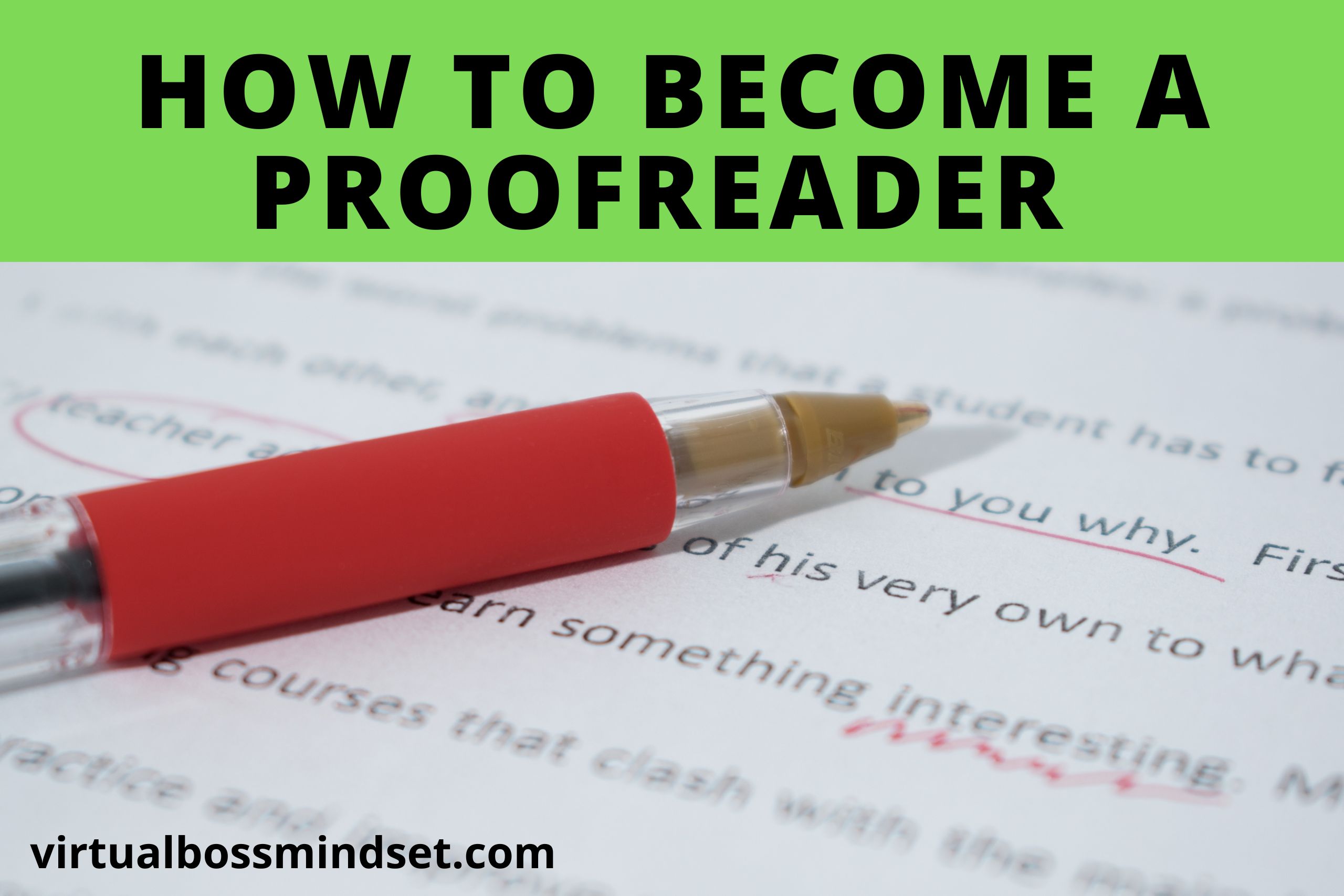
Are you looking for a career change or a way to make some extra money on the side? Becoming a proofreader may be the perfect fit for you. This lucrative field is in high demand, and with the rise of remote work opportunities, a proofreading career has never been more accessible. In this guide, we’ll break down the steps to becoming a successful proofreader in 2024, without needing a degree.
Understanding the Role of a Proofreader
The first step in becoming a proofreader is understanding the role you’ll play in the publishing process. Proofreaders are responsible for reviewing written material, including books, articles, and other written content, to ensure it is free of errors and ready for publication.
They are the final line of defense against grammatical errors, typos, and spelling mistakes. The importance of their work cannot be overstated, as one error can be the difference between a successful publication and a flop.
Proofreading is a critical step in the publishing process, and it requires a great deal of attention to detail. A proofreader must have a deep understanding of the English language and be able to spot errors that others might miss.
They must also have strong communication skills and be able to work well under pressure to meet tight deadlines.
What Does a Proofreader Do?
A Proofreader reviews written work to ensure that it is free of any errors. They check for grammatical mistakes, punctuation errors, incorrect spelling, and formatting inconsistencies. The goal is to produce high-quality content that is error-free, ensuring that readers can focus on the message rather than the mistakes. This also means that proofreaders need to have a keen eye for detail and excellent proofreading skills.
Proofreading is a highly specialized skill, and it requires a great deal of focus and attention. A proofreader must be able to catch even the smallest errors, such as a missing comma or a misplaced apostrophe. They must also be able to work quickly and efficiently to meet tight deadlines, without sacrificing the quality of their work.
Essential Skills for Proofreaders
While a formal degree isn’t required to become a proofreader, certain skills are essential for success in this field. These skills include:
- Excellent knowledge of the English language
- A great eye for detail
- Strong communication skills
- Ability to work well under pressure and meet tight deadlines
- Excellent proofreading and editing skills
In addition to these essential skills, a proofreader must also have a deep understanding of the publishing industry. They must be familiar with the different types of publishing, such as traditional publishing and self-publishing, and they must understand the different roles that are involved in the publishing process.
The Difference Between Proofreading and Editing
It’s important to understand that proofreading and editing are two different things. Proofreading involves reviewing written material for spelling, grammar, and punctuation errors.
Editing, on the other hand, involves making revisions to written material to improve its overall quality. While some proofreading jobs may require some light editing, it’s important to know what you’ll be expected to do in a particular role.
Proofreading is a critical step in the publishing process, and it requires a great deal of skill and expertise. A good proofreader can make the difference between a successful publication and a failure, and they are an essential part of the publishing industry.
Getting Started in Proofreading
Now that you understand what the job entails, it’s time to get started on your proofreading journey. Proofreading is an essential part of the writing process that ensures clarity, accuracy, and consistency in written communication. It involves reviewing written material to identify and correct errors in grammar, spelling, punctuation, and formatting.
A successful proofreader must have a sharp eye for detail, a strong command of the English language, and excellent communication skills.
The Proofread Anywhere Course offers a free workshop to help you leverage the skills you need.
Self-Assessment: Are You a Good Fit for Proofreading?
The first step in any career change is self-assessment. Do you have what it takes to be a successful proofreader? Assess your strengths and weaknesses to determine if this is the right career path for you. A good proofreader must have a passion for language and a commitment to accuracy.
They must be able to work independently, manage their time effectively, and meet deadlines. Take an online quiz or talk to other professionals in the field to learn more about the skills and qualities required for success in this field.
Building Your Proofreading Skills
Next, start building your proofreading skills through online courses, books, or workshops. There are numerous resources available that can help you improve your grammar, spelling, and punctuation skills. Even if you have a strong grasp of the English language already, it’s important to constantly improve and refine your skills.
Read widely, practice writing, and seek feedback from others to hone your skills.
Additionally, consider investing in tools that can help you streamline your proofreading process. There are many software programs and apps available that can help you catch errors quickly and efficiently.
Finding Your Proofreading Niche
Proofreading is a broad field with many niches to choose from. Consider what types of materials you enjoy reading and what industries interest you. For example, medical proofreading may require a different set of skills than proofreading for a pet magazine. Find your niche and become an expert in that field. This will help you stand out in a crowded market and attract clients who value your specialized knowledge.
Networking is also an important part of finding your niche. Attend industry events, join professional organizations, and connect with other proofreaders online to learn about new opportunities and build relationships in your field.
Remember, becoming a successful proofreader takes time, dedication, and hard work. But with the right skills, mindset, and approach, you can build a rewarding career in this field.
Training and Certification Option
If you have a keen eye for detail and love to read, a career in proofreading might be the perfect fit for you. Not only is it a fulfilling job, but it can also be quite lucrative. However, to become a successful proofreader, you need to have the right training and certifications under your belt. In this article, we’ll explore some of the best options available for training and certification in the field of proofreading.
Best Online Proofreading Course
Online courses are a great way to learn the skills you need to become a successful proofreader. The beauty of online courses is that you can learn at your own pace and from the comfort of your own home. There are numerous options available, ranging from free courses to paid courses taught by industry professionals.
One popular option is Proofread Anywhere, which offers a comprehensive workshop that covers everything from grammar and punctuation to formatting and style. The course is taught by Caitlin Pyle, an experienced proofreader that made 6 figures proofreading.
Another great option is the American Society of Journalists and Authors, which offers a variety of courses and webinars on proofreading and editing.
The courses are taught by industry professionals and cover a wide range of topics, from proofreading basics to advanced editing techniques.
The Editorial Freelancers Association is also a great resource for online courses and training. They offer a variety of courses on proofreading, copyediting, and other editorial skills, all taught by experienced professionals in the field.
Professional Proofreading Associations and Certifications
Joining a professional proofreading association or obtaining a certification can help boost your credibility and increase your chances of landing high-paying jobs.
Some popular associations include The American Society of Journalists and Authors and the Editorial Freelancers Association.
These associations offer a variety of benefits, including networking opportunities, job boards, and access to industry resources.
They also offer certifications that can help you stand out in a crowded job market. For example, the Editorial Freelancers Association offers a certification program for proofreaders and editors that includes a rigorous exam and ongoing professional development requirements.
Building Your Portfolio
Your portfolio is an essential tool in proving your expertise and landing proofreading jobs. As you build your skills, start compiling a portfolio of your best work to showcase to potential employers.
Your portfolio should include a variety of samples that demonstrate your ability to proofread and edit different types of content, such as academic papers, marketing materials, and website copy. Be sure to highlight any particularly challenging projects you’ve worked on and any positive feedback you’ve received from clients.
In conclusion, becoming a successful proofreader takes time and dedication, but with the right training and certifications, you can achieve your goals. Whether you choose to take online courses, join a professional association, or build your portfolio, the key is to keep learning and growing as a professional.
Finding Proofreading Jobs and Clients
Proofreading is an essential part of the writing process, and it requires a keen eye for detail and a strong grasp of grammar, punctuation, and syntax. If you’re a skilled proofreader looking for work, there are several ways to find jobs and clients.
Freelance Platforms for Proofreaders
Freelance platforms such as Upwork, Fiverr, and Freelancer.com are great places to start looking for proofreading jobs. These platforms allow you to create a profile, showcase your skills and experience, and bid on jobs that match your qualifications. However, keep in mind that the competition can be fierce, and you may need to start with lower-paying jobs to build your portfolio and establish a reputation.
Once you’ve built up a solid portfolio and established a reputation on these platforms, you may be able to command higher rates and attract more high-quality clients.
36 Places to Find Proofreading Jobs
Networking and Building Relationships
Building relationships with industry professionals can go a long way in landing high-paying proofreading jobs. Attend industry conferences, join online communities, and reach out to other professionals in your niche to grow your network. By establishing yourself as a knowledgeable and reliable proofreader, you may be able to secure long-term contracts or referrals from satisfied clients.
One effective way to network is to join professional organizations such as the Editorial Freelancers Association or the American Society of Journalists and Authors. These organizations offer networking opportunities, job boards, and other resources that can help you grow your business.
Social Media and Online Communities for Proofreaders
Social media and online communities are great places to connect with other proofreaders and potential clients. Join Facebook groups and LinkedIn groups to stay up-to-date on industry news and to connect with industry professionals. These groups can also be a great source of job leads and referrals.
Another way to build your online presence is to start a blog or website. By creating valuable content related to proofreading, you can establish yourself as an authority in your field and attract potential clients to your site.
Overall, finding proofreading jobs and clients requires persistence, networking, and a strong online presence. By leveraging the resources available to you and building relationships with industry professionals, you can grow your business and establish yourself as a successful proofreader.
Setting Up Your Proofreading Business
Starting a proofreading business can be a lucrative and rewarding endeavor. Proofreading is an essential service that helps individuals and businesses ensure that their written content is error-free and polished. If you have a keen eye for detail and a passion for language, starting a proofreading business might be the perfect career for you.
Creating a Professional Website
Creating a professional website is essential in establishing your brand and credibility. Your website should not only be visually appealing but also informative and easy to navigate. Make sure to include information about your services, rates, and portfolio. Your portfolio should showcase your best work and demonstrate your expertise in proofreading.
It’s also important to ensure that your website is optimized for search engines. This means using relevant keywords throughout your website and having a mobile-friendly design. A well-designed website can help you attract new clients and establish yourself as a professional in the field.
Setting Your Rates and Billing Clients
The rates you charge will depend on your level of expertise and the type of proofreading you’re doing. Charge by the hour, page, or project, and be sure to include a detailed contract with your clients. Your contract should outline the scope of work, payment terms, and deadlines. It’s important to be transparent about your rates and billing policies to avoid any misunderstandings or disputes with clients.
Consider offering discounts for larger projects or long-term clients. This can help you build a loyal customer base and increase your revenue over time.
Managing Your Time and Workflow
It’s important that you might be thinking about getting things in order to get your proofreading business up. Having a good time management is essential in the proofreading field, particularly if you’re working on several projects at once. Use tools such as Trello, or Asana, to help manage your workflow and deadlines. These tools can help you stay organized and prioritize your tasks, ensuring that you meet your clients’ deadlines.
It’s also important to set realistic expectations with your clients regarding turnaround times. Make sure to communicate clearly about your availability and the estimated time it will take to complete their project. This can help you avoid overcommitting and ensure that you deliver high-quality work on time.
By following these tips, you can set up a successful proofreading business and establish yourself as a professional in the field. With hard work and dedication, you can build a loyal client base and enjoy a fulfilling career as a proofreader.
Tips for Success in the Proofreading Industry
Staying Up-to-Date on Industry Trends
Staying up-to-date on industry trends is essential in the constantly evolving landscape of proofreading. Subscribe to industry publications and attend conferences to stay informed.
Continuous Learning and Skill Development
Proofreading, like any other field, requires continuous learning and skill development. Attend workshops, take courses, and constantly refine your skills to stay sharp.
Balancing Work and Personal Life as a Proofreader
It’s important to find a healthy work-life balance as a proofreader. And it can be tempting to take on as many projects as possible, it’s important to prioritize your personal life to avoid burnout.
Conclusion
Becoming a proofreader in 2024 doesn’t require a degree. Follow the steps in this guide, and you’ll be on your way to a successful career in proofreading.





